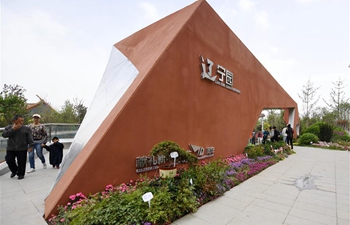SINGAPORE, May 22 (Xinhua) -- For Singapore to produce its Nobel laureate in the scientific field, there needs to be "a safe space for bright students to explore what they find interesting" and the freedom to make mistakes, said Israel's Ambassador to Singapore Simona Halperin here Wednesday.
Halperin made the remarks in response to a question raised at a public lecture organised by the World Scientific Publishing house with a theme of "What is behind Israel's innovative culture: Understanding the secrets of Israel and the Jewish people."
Israel, a country with limited natural resources and a vast desert, has tapped on its human capital to transform into a start-up nation - in areas ranging from medical devices to cyber security, from digital health to agriculture and water technologies, from Internet of Things (meaning the concept of connecting any device to the Internet and to other connected devices) to artificial intelligence.
To build a nation with creative and innovative thinkers, the secret lies in shaping attitudes in the younger generation, she said. In Israel, children grow up in a supportive environment, where they embrace the joy of learning by being allowed to be themselves and encouraged to try even though they may end up in failure.
While Singapore typically has the highest achieving students in international education rankings, Israel's students do not fare as well, said Halperin.
But unlike Singapore's highly regimented education system where rote-learning and following the rules is the norm, the Israeli children constantly ask questions and challenge their teachers' authority, which Halperin said creates a national culture that can "produce excellent science" and unconventional solutions.
She said, "If you teach them that only what the teacher says is right, they will conform to it ... If you want to be creative and innovative, it's not about asking questions that have been asked and answered a million times before. It's about providing the supportive environment for people to ask their own questions."
The Israelis also possess an innate curiosity and hunger to make their society a better place. Halperin explained, "They don't go to the lab and do science because they are dreaming of (achieving the) Nobel Prize, but because they are puzzled about something."
Besides a supportive learning environment, Halperin said that there are numerous factors that allow Israel's innovative culture to flourish.
Namely, its people have the freedom and the "license to fail" - one of the most critical and important ingredients for entrepreneurship and real breakthroughs, she said.
Halperin cited the example of how Better Place - an electric-car venture founded by Shai Agassi who had the visionary idea of using swappable batteries - winded up bankrupt in 2013.
Investors might have seen it as a "colossal failure", but it has spurred the growth of more than 500 new Israeli start-ups with innovations in automotive and smart mobility solutions - which Halperin described as a "major victory" for the country.
More recently in April this year, Israel's Beresheet spacecraft - the first privately funded mission to the Moon - crashed on the lunar surface. It had hoped to be the fourth country to achieve a soft landing on the Moon, following the former Soviet Union, the United States and China.
Again, it might have seemed a massive failure, but Halperin pointed out that it has sparked an interest among thousands of Israeli children towards astrophysics and space studies. Undeterred, the team is already working on building the Beresheet 2, the second Israeli spacecraft designed to carry the mission to land on the Moon.
"If you ask me, (we're) a small country, but we have big dreams ... The sky is not the limit," said Halperin.
Israelis also possess the unique "chutzpah" (a Hebrew word) attitude which embodies the "spirit of audacity and cheekiness, and never taking no for an answer," she said.
There are other factors such as its vibrant population comprising of immigrants from different cultures, its high level of literacy, its status as a happy society, and government policies which supports and funds even high-risk innovative projects for applied research.













